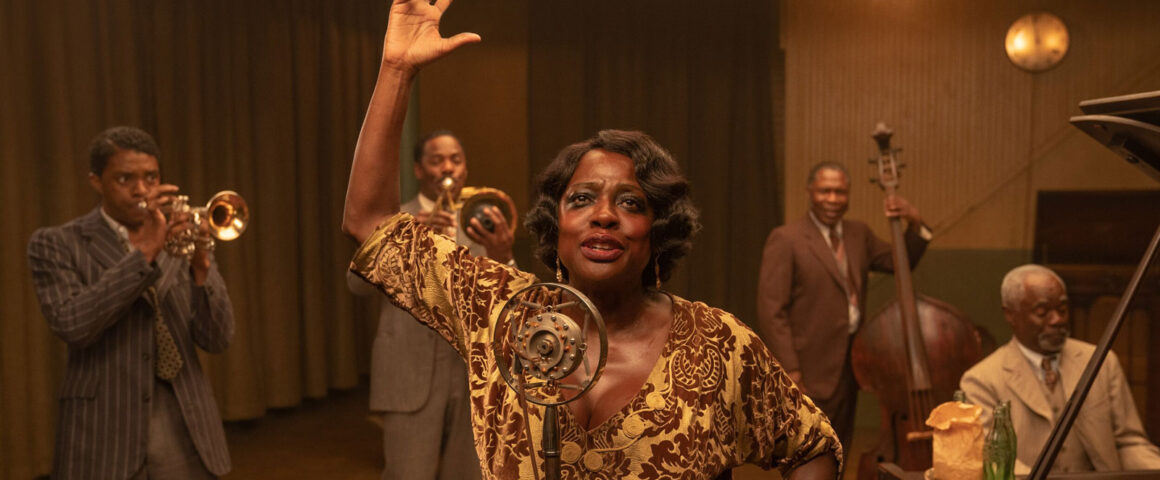The second of his 12 plays dramatizing the Black experience in America during the twentieth century, August Wilson’s Ma Rainey’s Black Bottom is a haunting and powerful experience that focuses on Gertrude “Ma Rainey” (Viola Davis, “Widows”), known as “The Mother of the Blues,” one of the first popular Black blues singers to gain acceptance from a white audience. Brought to the screen by George C. Wolfe (“You’re Not You”) and produced by Denzel Washington, the title refers to Ma’s song, the “Black Bottom,” a popular dance created by African-American musicians in the 1920s.
Adapted by Ruben Santiago-Hudson from the 1982 play, the entire film takes place in a Chicago recording studio on a hot summer day in 1927. For a rehearsal space, the producers found an old Lithuanian community center in the city’s South Side section that had fallen into disuse with “an air-conditioning system that, when you turned it on, it sounded like the end of the world.” The film chronicles the rehearsal of Rainey and her four-piece jazz band, a mix of seasoned veterans such as Cutler (Colman Domingo, “If Beale Street Could Talk”) on trombone, Toledo (Glynn Turman, “John Dies at the End”) on piano, Slow Drag (Michael Potts, “Cicada”) on bass, as well as the young horn player, Levee (Chadwick Boseman, “Black Panther”) who dreams of having his own band.
As Ma Rainey’s Black Bottom begins, Ma’s agent Irvin (Jeremy Shamos, “Birdman”) and three members of the band await the singer’s arrival in front of the dilapidated-looking studio on a hot summer day. Wolfe said that the film was moved from winter to summer because, as he explains, “I wanted the audience to see the heat. I wanted them to see, to understand the impact, and also to understand how for people from the South coming to Chicago, what an alien place it was.” Before her arrival, studio owner Sturdyvant (Jonny Coyne, “Gangster Squad”) warns Irvin that he will not put up with any of Ma’s “shenanigans,” calling the singer a prima donna who expects the world to do her bidding.
We only meet Rainey after another vehicle runs into her shiny new car and she turns to Irvin to rescue her from a policeman who threatens to arrest her for assaulting a cab driver. Davis’ look is slightly bizarre, resembling a performer straight out of vaudeville with her horse hair wig, gold dress, gold teeth and a gold-chained necklace, though the costume is true to Rainey’s character. Ma shows up with her lover Dussie Mae (Taylour Paige, “White Boy Rick”) and Wolfe makes no attempts to hide Rainey’s preference for women. Though the band knows Dussie is off-limits, her flirtatious nature is too much for Levee to resist.
Ma, demanding from the time she arrives, commands Irvin to bring her three bottles of cold Coca-Cola, showing no deference to her manager who is compelled to bear much of her abusive language, knowing that she is his primary vehicle for selling records. “All they care about is my voice,” Ma says about the white man’s reaction to the blues, “They hear it come out, but they don’t know how it got there. They don’t understand that that’s life’s way of talking.” Ma insists that her nephew Sylvester (Dusan Brown, “42”) introduce her song even though she knows he stutters, insisting that the boy continue until he gets it right (even after more than seven takes).
She also refuses to adapt to Levee’s more modernized version of her Black Bottom song and, of course, she gets her way. All is forgiven, however, when the camera focuses on her shaking hips and her mesmerizing voice that can send a room into ecstasy. Levee, played by Chadwick Boseman in his last role, provides a heartbreaking performance as an ambitious but frustrated cornet player, outwardly charming but inwardly seething with rage. Ambitious to have his own band performing his own songs, Levee calls the band’s present musical agenda passé, “nothing but old jug-band music.”
Levee also delivers two of the most haunting and powerful speeches about the trauma of his life as a child. One when his chest was cut by a gang of white men attempting to rape his mother, and another when he belittles Cutler for his faith, asking where God was when he was undergoing his traumatic childhood. Referring to his speech, Wolfe says that, “It was “totally raw, fully committed, fully there. It was, it was a miraculous speech, it was a miraculous day. Afterwards,” he continued, “Chadwick just started to sob, and Colman hugged him, and then Chadwick’s girlfriend basically picked him up.”
The knowledge that Boseman was dying at the time lends an extraordinary degree of poignancy to the scene. Also heartbreaking is when Levee, enraged at having been exploited and lied to by Sturdyvant, destroys his career in an inexplicable act of rage. Though Ma Rainey’s importance is somewhat overshadowed by Levee’s dramatic arc, she remains an indelible force and the film allows us to pay tribute to an American icon that many of us had forgotten or never heard of.
To play Ma, Davis says that she channeled “the part of my culture, and even a part of me and my family members, that doesn’t feel worthy and thinks it has no value. I channeled the depth of the soul of every African-American who never could follow their dreams, who were always told that they were less than.” Today, when the assertion that “Black Lives Matter” is a rallying cry, Ma Rainey reminds us that the struggle for the dignity and worth of Black people has been going on for a very long time.




'Movie Review: Ma Rainey’s Black Bottom (2020)' has no comments